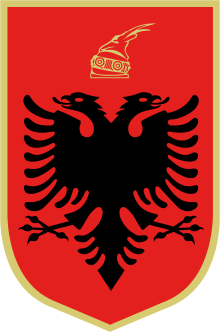Human rights in Albania
 |
| This article is part of a series on the politics and government of Albania |
|
|
Current issues concerning human rights in Albania include domestic violence, isolated cases of torture, and police brutality, the general condition of prisons, human and sex trafficking and LGBT rights.[1]
Human trafficking
There has been a growing awareness of human trafficking as a human rights issue in Europe (see main article: Human trafficking in Albania). The end of communism has contributed to an increase in human trafficking, with the majority of victims being women forced into prostitution.[2][3]
Albania is a country of origin and country of transit for persons, primarily women and children, trafficked for the purpose of sexual exploitation. The Albanian government has shown some commitment to combat trafficking but has been criticised for not fully complying with the minimum standards for the elimination of trafficking and failing to develop effective measures in witness protection.[1][4]
Human rights violations of Greeks
Human rights in Albania are violated by the Government which have targeted the Greek population via police and secret service according to Human Rights organisations.[5] Greek communities have been targeted by development projects and had their homes demolished in alleged ethnic targeting of Northern Epirus Greeks from Southern Albania,[6] where homes are systematically demolished.
See also
- Freedom of religion in Albania
- Internet censorship and surveillance in Albania
- Lëvizja Zgjohu (Wake up), an Albanian NGO involved in exposing political scandals.
- LGBT rights in Albania
References
- 1 2 Amnesty International,Human Rights in Republic of Albania
- ↑ Council of Europe
- ↑ "A modern slave's brutal odyssey". BBC News. 3 November 2004.
- ↑ U.S Department of State,"ALBANIA (TIER 2) Albania is a source country for women and children trafficked for the purposes of sexual exploitation and forced labor, largely to Greece and Italy, where many victims are then further transited to the United Kingdom, France and the Netherlands. Albanian children, especially ethnic Roma and Egyptian, continue to be trafficked externally for forced begging. Regional and international experts consider Albania to have significantly decreased as a transit country for trafficking in Western Europe. The Government of Albania does not fully comply with the minimum standards for the elimination of trafficking; however, it is making significant efforts to do so. The government remained committed to monitoring and preventing trafficking at the country's main ports and produced successful interdictions. However, implementation of Albania's anti-trafficking tools remained inadequate and a critical area of concern. Greater, proactive steps in the areas of protection and reintegration are needed to ensure the safety of victims. The government must apply available laws and programs, in addition to improving prevention for vulnerable groups. Trafficking-related corruption must also be addressed. Prosecution In 2004, the Government of Albania continued to arrest, prosecute, and convict traffickers. Its courts prosecuted 132 traffickers and handed down 121 convictions. Commendably, over half of the sentences during the reporting period were over five years in length and 30 traffickers were sentenced to more than ten years' imprisonment. In September 2004, the government adopted legislation that includes broad civil asset forfeiture provisions, requiring the accused trafficker to prove the legitimacy of sources of wealth. Prosecutors, however, had yet to employ the forfeiture provisions. Serious resource constraints and corruption among government officials continued to hamper anti-trafficking efforts. The government continued to investigate police involvement in trafficking; in 2004, four police officers were investigated for offenses related to trafficking. The government did not prosecute or convict any officials for trafficking complicity during the reporting period. Protection The government provided some facilities and personnel to assist trafficking victims, and operates its own National Reception Center; NGOs have two additional shelters. The government has begun work on a national referral mechanism involving law enforcement, social services, and NGO partners to improve the initial identification, reception, protection, and reintegration procedures for returnee victims. Police slightly increased the number of ad hoc referrals made to shelters in Albania via IOM and NGOs. Police referred 274 victims to the Vatra Center, a leading NGO in Albania providing shelter and reintegration services to victims. Notably, a number of police directorates opened their own temporary shelters to accommodate trafficking victims. However, regulations necessary for the implementation of witness-protection measures adopted in 2003 have yet to be finalized. In 2004, the Government of Albania established a witness relocation program and adopted special witness protection provisions allowing for endangered witnesses in trafficking cases to testify via remote video link. The program remains unfunded. Prevention In 2004, the government conducted few prevention programs, and continued to reply primarily on NGOs and international organizations to carry out such activities. The Ministry of Education began to incorporate prevention activities into school curricula. In 2004, the government adopted a newly improved Strategic Framework and National Action Plan that outlines a comprehensive and targeted approach to trafficking. However, few aspects of the plan have been funded or initiated. In February 2005, the government also finalized its Child Trafficking Strategy and Action Plan. "
- ↑ https://www.hrw.org/legacy/summaries/s.albania952.html
- ↑ http://www.himara.gr/epikairotita/topika-dromena/5385-oi-alvanoi-arpazoun-spitia-apo-tous-vorioipirotes